Key takeaways:
- Local business networking is crucial for building meaningful relationships that can lead to collaboration and support within the community.
- Choosing local vendors fosters economic stability and creates personal connections that enhance professional experiences.
- Effective networking involves attending community events, utilizing social media, and following up on initial conversations to nurture relationships.
- Evaluating vendor quality requires assessing communication style, reviewing portfolios, and seeking references for confident decision-making.
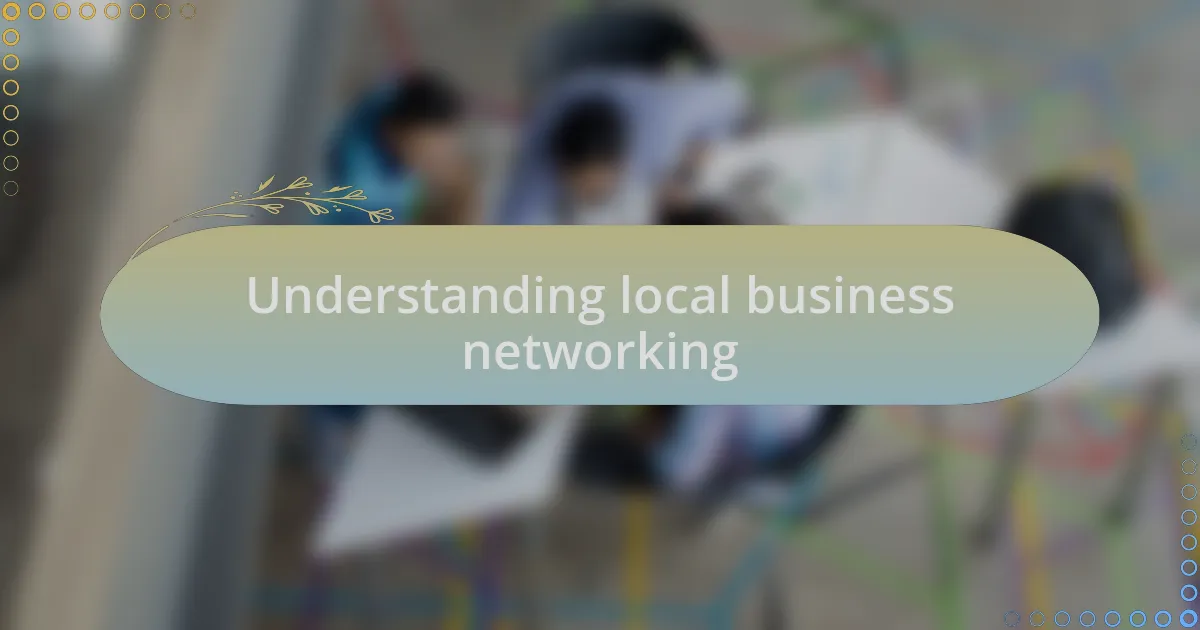
Understanding local business networking
Local business networking is all about building connections that can lead to mutual growth and support. I remember the first time I attended a networking event; I felt nervous but excited. Seeing familiar faces and engaging in genuine conversations made all the difference. Have you ever noticed how those initial interactions can spark lasting relationships?
Understanding local business networking also means recognizing its power within the community. As a small business owner, I’ve relied on my local network to share referrals and insights during challenging times. It’s remarkable how local vendors often have a wealth of experience, and leaning on each other can provide a safety net that’s invaluable. Isn’t it comforting to know you’re not alone in navigating the ups and downs of entrepreneurship?
Furthermore, nurturing these relationships can lead to unexpected opportunities. I still vividly recall collaborating with a fellow vendor on a community event, which not only boosted our visibility but also strengthened our bond. What if we approached networking not just as a way to gain clients, but as a chance to create meaningful partnerships? The emotional rewards of supporting one another often extend far beyond financial success.
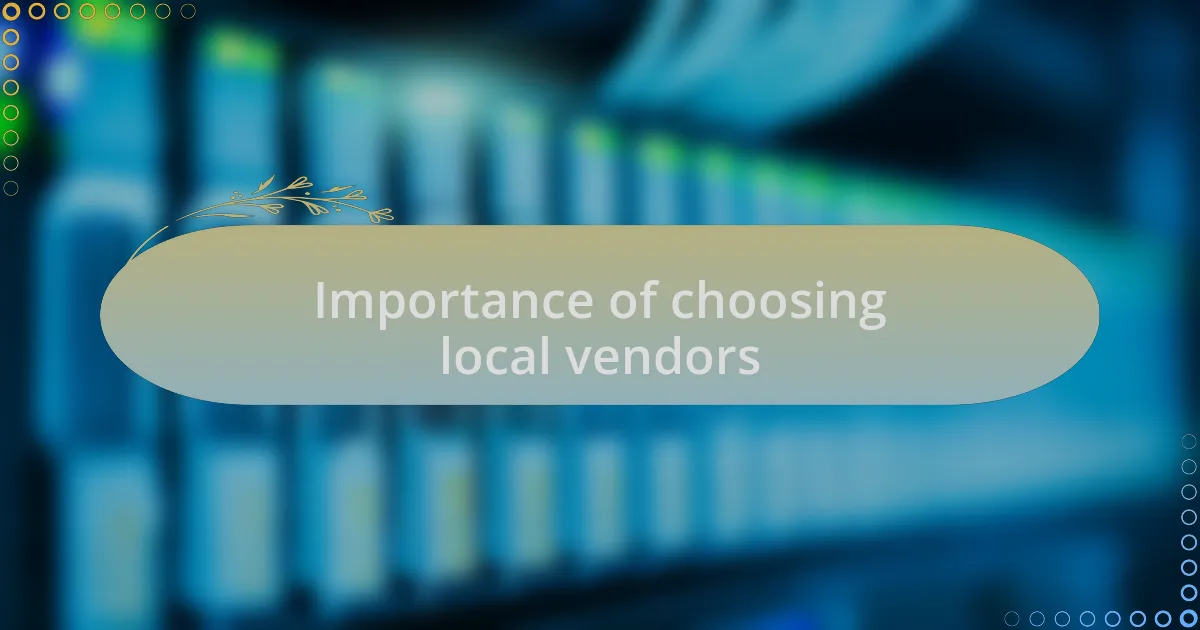
Importance of choosing local vendors
Choosing local vendors is vital for several reasons. For one, they often understand the unique needs and preferences of the community. I remember when I switched to a local supplier for my packaging materials; the personalized service and attentiveness were unmatched. Have you ever felt that sense of connection when a vendor knows exactly what you need without you having to explain it?
Moreover, supporting local businesses fosters economic stability within the community. I’ve witnessed firsthand how spending money at local shops leads to job creation and keeps the local economy thriving. When I buy from nearby vendors, I genuinely feel like I’m investing in my neighborhood’s future. Isn’t it rewarding to think that your purchases can help your community flourish?
Lastly, there’s something special about the relationships you build with local vendors. I still remember a local artist whose work I featured in my shop. Our discussions went beyond transactions; we exchanged ideas that enriched both our businesses. Don’t you think these connections can elevate our professional lives and create a sense of belonging? Choosing local isn’t just a smart business decision; it’s about weaving a tighter community fabric.
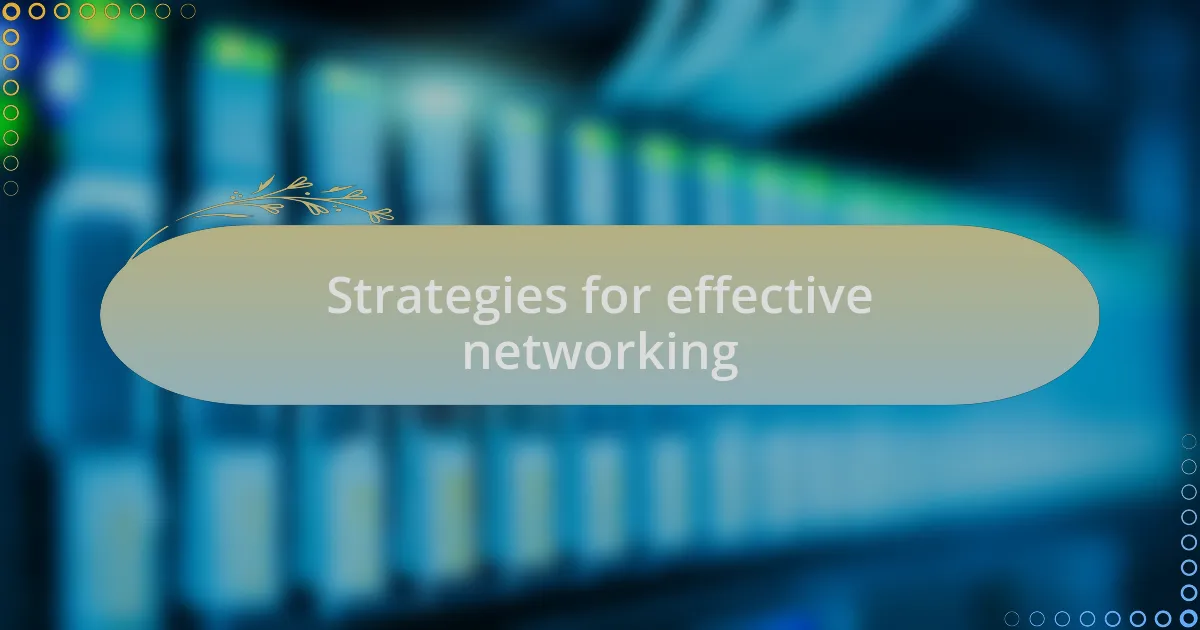
Strategies for effective networking
Effective networking hinges on genuine connections. During my journey to find reliable local vendors, I learned the importance of attending community events and frequenting local markets. At one small fair, I struck up a conversation with a local florist, and we bonded over our shared passion for community initiatives. Isn’t it interesting how a simple chat can lead to fruitful collaborations?
Another strategy I found particularly impactful is to leverage social media platforms to connect with local entrepreneurs. By joining groups specific to my area, I was able to engage in discussions that brought valuable insights and often led to introductions to potential vendors. It felt energizing to interact with like-minded individuals, and I started building connections without leaving my home. Have you ever felt that spark of creativity when surrounded by passionate people online?
Lastly, following up after making initial connections is crucial. I made it a habit to send a quick message or email after meeting someone, expressing my appreciation for our conversation. This simple act can strengthen relationships and lead to future opportunities. I still recall the vendor who later referred me to a fantastic graphic designer just because I reached out. Isn’t it amazing how a little effort can go a long way in nurturing professional bonds?

How to research local vendors
When I set out to find local vendors, one of my first steps was to scour online reviews. These platforms often provide a wealth of information, revealing not just the quality of services but also the experiences of previous customers. Have you ever found yourself drawn to a vendor with glowing reviews? It’s hard to resist when you can read about someone else’s positive experience before making a decision.
Exploring local directories and websites dedicated to community businesses can also be incredibly helpful. I stumbled upon a site that spotlighted businesses in my area, and it opened my eyes to hidden gems I might have otherwise overlooked. It’s like discovering a new favorite spot in your neighborhood; sometimes, the best finds are right under your nose, waiting to be discovered.
Networking with other local business owners is another avenue I found effective. I reached out to a couple of entrepreneurs whose offerings complemented mine, and we exchanged recommendations. This not only broadened my vendor pool but also created a camaraderie I cherish. Which connections have expanded your own network lately? Together, we can sometimes uncover resources and contacts that we’d never find alone.
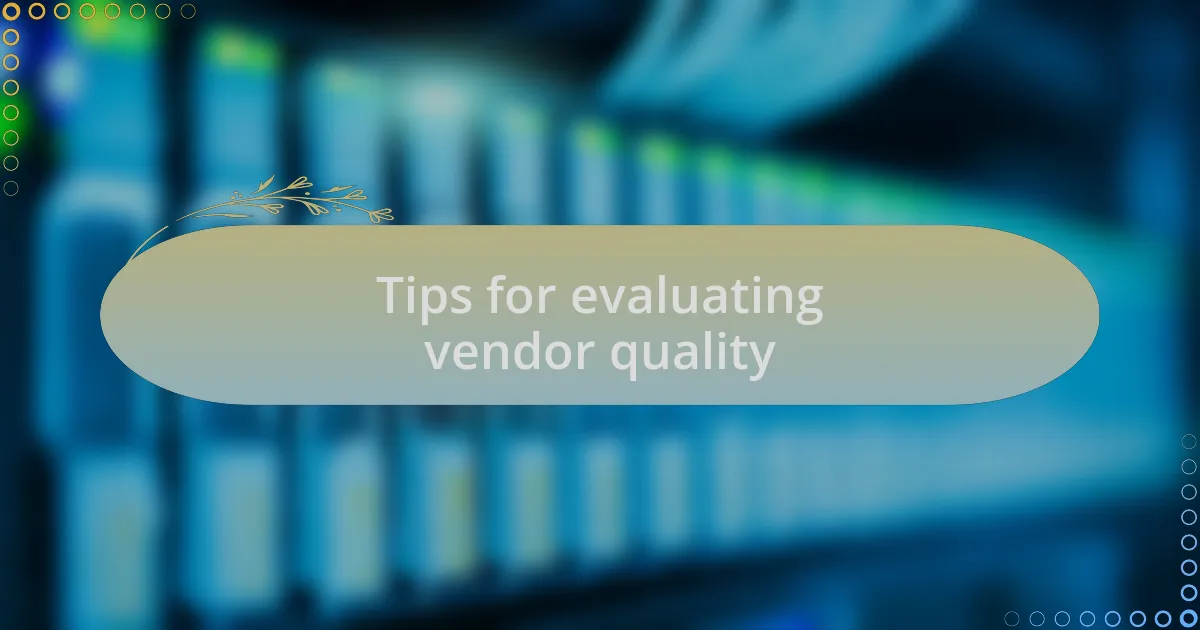
Tips for evaluating vendor quality
When assessing vendor quality, I always prioritize their responsiveness and communication style. For instance, I once reached out to a potential supplier for a quote and found their response time to be remarkably quick. This immediate engagement gave me confidence, as it indicated they valued customer service and were likely to be reliable in future interactions. How does a vendor’s communication style shape your perception of their professionalism?
Next, I suggest looking into their portfolio or samples of previous work. I remember working with a graphic designer who shared past projects that resonated with my vision. Seeing tangible examples of their craftsmanship not only reinforced my decision but also showcased their ability to meet client needs. What do you look for in a vendor’s portfolio to gauge their fit for your own projects?
Finally, don’t hesitate to ask for references. I once contacted a vendor’s previous clients to hear firsthand about their experiences, and the insights were invaluable. A vendor who is willing to provide references demonstrates confidence in their work. Have you ever reached out to past clients, and what did their feedback reveal that you hadn’t considered before?

Personal experiences with local vendors
I have a memorable experience with a local florist that really illustrates how personal connection can elevate vendor relationships. When I visited her shop, the owner warmly welcomed me and took the time to understand my needs for a special event. That genuine interest went beyond simply making a sale; it created a sense of trust that I couldn’t overlook. Have you ever felt that comfort with a vendor, and how did it influence your decision to choose them?
Another instance that stands out was when I worked with a local contractor for some home renovations. The project initially seemed daunting, but his professionalism and attention to detail eased my worries. I remember feeling a wave of relief when he invited me to see the progress regularly, explaining every step in a way that made the process feel collaborative. How important is it for you to be involved in your vendor’s work, and how does that enhance your overall experience?
I’ve also had encounters with vendors who didn’t quite hit the mark. One time, I hired a catering service for a local event, and their lack of organization led to confusion on the day of. While they eventually resolved the issues, the stress it caused wasn’t worth the savings. I learned the hard way that investing a bit more in reliable vendors can save significant headaches later on. Have you ever faced a similar situation that reshaped your approach to selecting vendors?
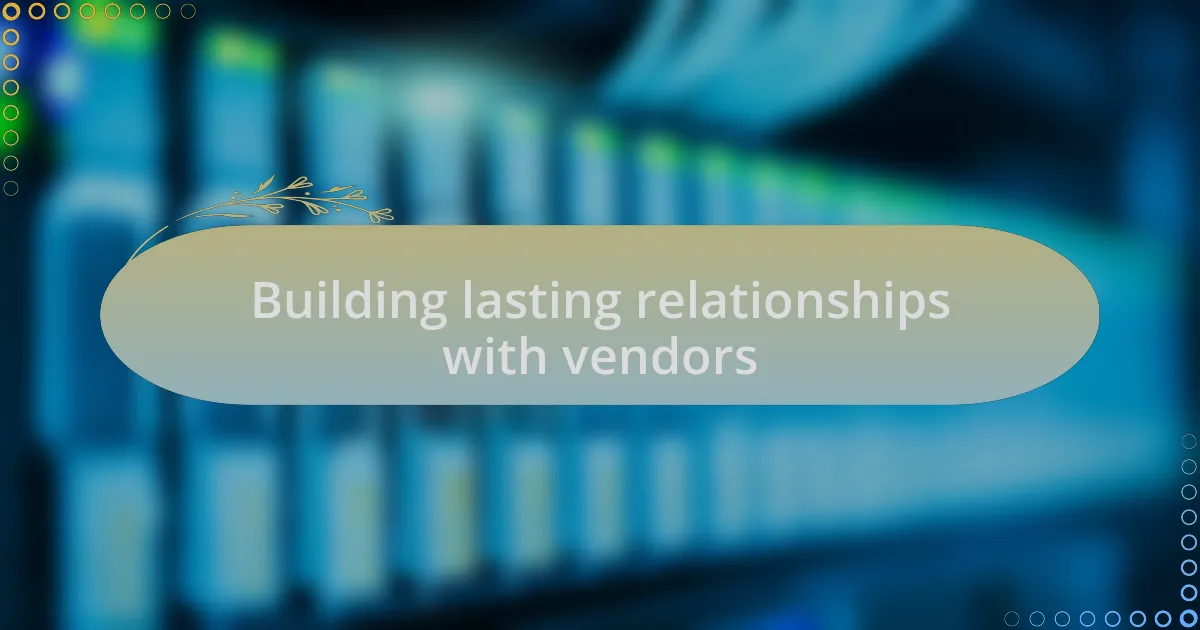
Building lasting relationships with vendors
Building lasting relationships with vendors hinges on consistent communication and trust. I recall a fantastic experience with a local mechanic who took the time to explain what was wrong with my car instead of just handing over the bill. His transparency not only made me feel valued but also encouraged me to return for future services, knowing I would receive honest advice. Have you ever had a vendor take the time to explain things in a way that made you feel involved rather than just another customer?
Another key aspect of building a strong vendor relationship is reliability. I once partnered with a graphic designer for a series of marketing materials, and her constant updates on the project made a world of difference. Each time she checked in, it reassured me that my brand was in good hands. I often wonder, doesn’t it feel good when vendors show genuine investment in your projects?
Lastly, I’ve found that appreciating your vendors can solidify those relationships even further. A simple thank you or a positive review can go a long way, as I learned from a small bakery where I frequently ordered treats for my office. After sharing a glowing testimonial, I was pleasantly surprised to receive a handwritten note of gratitude. Isn’t it amazing how a little recognition can foster deeper connections?